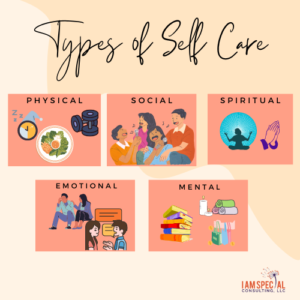Blogs
| According to the Global Self-Care Federation, self-care means the “practice of individuals looking after their health using the knowledge and information available to them.”
Self-care describes how people take care of their bodies, minds, and emotions. It can be interpreted many ways and in many ways. It could be as simple as getting enough sleep every night or taking a 5-minute walk every day. You can also spend time in nature, practice mindfulness and meditation, take time to set boundaries and engage in activities that please you. You should prioritize self-care as it can significantly reduce stress, boost your mood, and improve your overall quality of life. Often, we ignore taking care of ourselves because of our busy schedules, but we must listen to our mind, heart, and body and pause for a bit. It’s vital to assess how you care for yourself, addressing different areas in your life to ensure that you care for your body, mind, and spirit. Why is self-care important? Self-care is essential because it encourages you to maintain a healthy and balanced relationship with yourself to radiate good feelings and good vibes to others. You have to fill in your cup before you give yourself to others. You are empowering yourself and striving to become the best version of yourself. Types of Self-Care Physical Self-Care You have to take care of your body if you want it to run efficiently. Always remember that the body and mind are connected; when you always care for your body, you will feel at your best. Physical self-care includes how much sleep you’re getting, your eating and drinking habits, how much physical activity you are doing, and how you are attending to your bodily needs. Getting yourself checked can also be part of physical self-care. Ask these questions to yourself to assess which area you need to improve: Are you getting enough rest? Is your diet good for your body type? Are you getting enough physical activities? Are you on top of your health? Emotional (Heart) Self-Care You must be aware of healthy coping skills to deal with your emotions, especially with uncomfortable feelings like anxiety, frustration, and loneliness. Several activities for emotional self-care help you express your feelings safely and regularly. Activities could be talking to friends or loved ones or finding someone to share your feelings and emotions with. Ask yourself these questions to assess your emotional self-care plans: How do you healthily process your feelings and emotions? Do you have activities planned to help you whenever you feel emotionally drained? Mental Self-Care How you think, and the activities you are filling your mind affect and influence your mental well-being. Thinking positively and looking to the brighter side of the situation could be a good start to healthy mental well-being. Mental self-care includes activities that fill your mind to be mentally healthy. Some activities are reading books, doing what relaxes you, or finding a new hobby. Ask yourself these questions when you think about your mental self-care: What activities are you doing to support your mental health? What plans have you made to ensure you create balance in your life? Social Self-Care Socializing with people can also be part of self-care; however, because of our busy schedules, we frequently neglect our relationships with our friends and loved ones. Close connections with people are vital, and the best way to maintain healthy relationships is to put time, effort, and energy into building relationships with others, even if it’s Facetime or a quick Zoom party. You must determine your social needs and create a plan or schedule to balance your social life. Ask these questions to yourself to assess your social self-care: How do you nurture your relationship with your friends and loved ones? How often do you socialize with your friends and loved ones? Spiritual Self-Care Spiritual Self-Care doesn’t necessarily involve religion. It can be any activity to nurture your mind and spirit as long as it satisfies your need to develop a more profound sense of meaning, understanding, and connection with yourself, your spiritual guides, and the universe. Some activities may be meditation, praying, acts of kindness to self and others, or attending local or virtual spiritual communities. Ask these questions as you prioritize your spiritual self-care: What activities are you doing to fulfill your spiritual needs? What questions do you ponder about your life? The demands of your daily life can determine the type of self-care you should prioritize. We at I am Special Consulting LLC could help you devise a customized self-care plan that concentrates on you and what’s going on with your life. The main goal of creating the Person-Centered Plan is to ensure that you are on your path towards greatness by asking for what you need, getting what you need to take care of yourself, how you will face life’s challenges, and identifying what actions to take to reach your goal.
|







